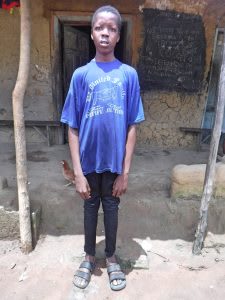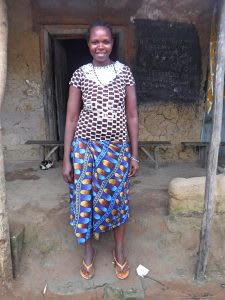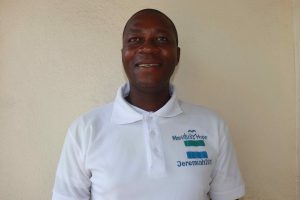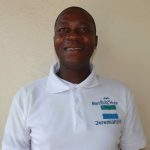While the water crisis affects all 200 people in Mapitherr, the ones who suffer the most are the kids.
The problem started when the main well in Mapitherr dried out. Since then, community members have had to travel a long distance across a busy highway to an alternative well in a neighboring community. This means they're fighting with a lot of people to get water during busy times before and after work or school.
 "The water crisis has been a major challenge in this community, especially to school-going pupils," said 13-year-old Abu K (pictured on the left).
"The water crisis has been a major challenge in this community, especially to school-going pupils," said 13-year-old Abu K (pictured on the left).
He continued: "Firstly, the water crisis plays a negative role in our academic performance. I and my brothers always go to school late due to the shortage of water in our community. We wake early in the morning to fetch [the] water we have in this community, but we are unable to get water due to the high number of people. We must wait for our turn to fetch water, and by the time we get water, it is already late for us to go to school on time. This is one of the reasons why we always perform poorly, because we always miss the first lesson, and sometimes, the teachers ask us to go home for [coming late]."
With so many people trying to claim their share of water, not everyone can be successful.
 "My children and I wake up early morning to go in search of water," said 35-year-old farmer and trader Fatmata Manseray (shown right).
"My children and I wake up early morning to go in search of water," said 35-year-old farmer and trader Fatmata Manseray (shown right).
"We normally meet a large crowd at the alternate water source," Fatmata continued. "We must wait for our turn before fetching water. We always return to our house late with just a small amount. My children are sometimes late to go to school when there is a serious water crisis. They struggle with everything just to get water, but sometimes their effort [is] in vain. By the time they get water, it is already late to go to school, and this has a negative impact on their academic performance."
It's so discouraging that, even after spending so much of their time trying to get water, the people of Mapitherr can never get enough of it to accomplish even the most basic everyday tasks.
"We sometimes fail to launder our uniforms because of the water crisis," Abu said. "We keep using the same [uniform] throughout the week. This makes our uniforms [dirty] within the shortest possible time. For those of us that came from poor families, we end up using our house clothes to go to school. This is really embarrassing compared to those whose families are strong."
Going to school wearing dirty clothes saps Abu's concentration, but even worse is when he hasn't eaten since the day before.
"If I do not come home and fetch water from the alternate water source for the preparation of food, we end up going to bed without eating," Abu explained. "Sometimes overcrowding at the alternate water source may prevent us from getting water [at] the time we need it. If we are late to come with water, our parents may decide to cancel the preparation of food, and this will make us tired, and hunger will be the order of the day. This simply means we are going to school the following day without eating. If we do not eat before going to school, we will not be able to pay attention."
"Sometimes, I leave my business place to fetch water," said Fatmata. "I lost my regular customers because they always miss me when they come around. This plays a negative role in the running of my business. The water crisis also prevents me from going to my shop early, because I must fetch water before going anywhere. As a farmer, I need water to process the crops. Most [of my] crops [dried out] because of [the] shortage of water."
The lack of water in Mapitherr taints every single aspect of the community members' lives. It's not surprising, therefore, that they were ecstatic to hear their dry well may soon be rehabilitated.
"On [our] arrival today, the people were so excited about the project," said our field officer, Moses. "One of them by the name of Sinneh took a cutlass and started [clearing the plants] around the proposed well site. Farming is a problem around the well, but the people have promised that they would stop planting crops around the well area."
"The problem of the water crisis will be solved by this well, and this will help to prevent disease outbreaks in the future and save the lives of the school-going people," Abu concluded.
A new water source will hopefully restore the lives of the people in Mapitherr. With free time, more energy, and a significant tool towards accomplishing their everyday tasks, things should improve rapidly.
Here’s what we’re going to do about it:
Well Rehabilitation
The well marked for this overhaul is dry for a few months every year and needs major work to supply adequate, clean water to the community year round. The pump will be removed, and a hand auger will be lowered inside and powered by a drill team. This hand auger will allow the team to drill several meters deeper to hit a sufficient water column that will ensure the well supplies water throughout all seasons.
As the team drills, casing will be installed, transforming the bottom of this hand-dug well into a borehole. PVC piping will connect this lower system directly to the pump, a construction that we know will also improve the quality of water.
Once this plan is implemented, everyone within the community will have access to safe drinking water in both quality and quantity, even through the dry months.
Hygiene and Sanitation Training
There will be hygiene and sanitation training sessions offered for three days in a row.
After our visit, the hygiene and sanitation trainer decided it would be best to teach community members how to build a tippy tap (a hand-washing station built with a jerrycan, string, and sticks). They will use these tippy taps for handwashing demonstrations, and will also teach about other tools like dish racks and the importance of properly penning in animals.
These trainings will also strengthen the water user committee that manages and maintains this well. They enforce proper behavior and report to us whenever they need our help solving a serious problem, like a pump breakdown.






































